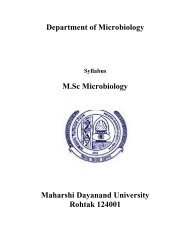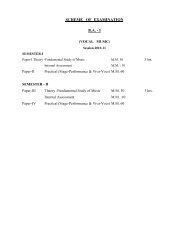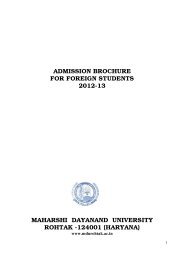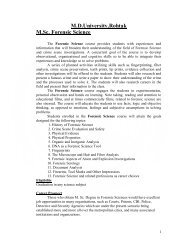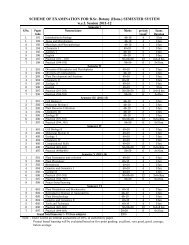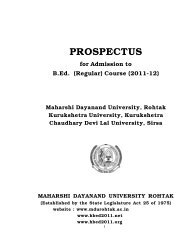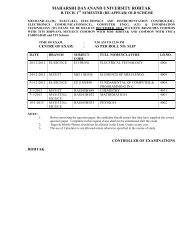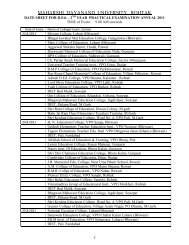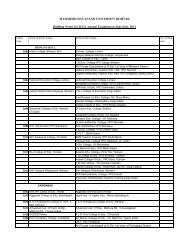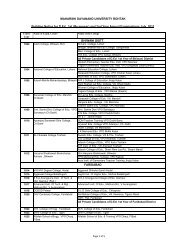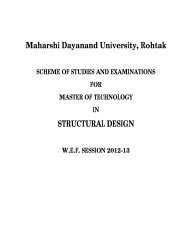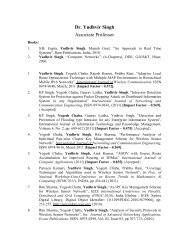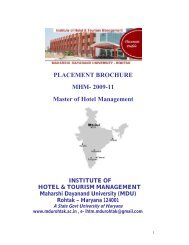Maharshi Dayanand University Rohtak
Maharshi Dayanand University Rohtak
Maharshi Dayanand University Rohtak
You also want an ePaper? Increase the reach of your titles
YUMPU automatically turns print PDFs into web optimized ePapers that Google loves.
SYLLABUS M.A. (Sociology) 9 10<br />
MAHARSHI DAYANAND UNIVERSITY<br />
M.A. Sociology Semester - III<br />
Compulsory Paper-13<br />
Rural Sociology<br />
Duration of Examination : 3 Hours<br />
Max. Marks : 100<br />
Theory : 80<br />
Internal Assessment : 20<br />
Unit-I<br />
Introduction to Rural Socology : Origin of Rural Socioogy,<br />
Nature and Subject Matter of Rural Sociology, Importance<br />
of the Study of Rural Rural Sociology, Rural Urban<br />
Differences, Village Studies in India<br />
Unit-II<br />
Rural Social Structure : Caste and Class in Rural Set up,<br />
Inter Caste relations and Jaimani System, Changing Trends<br />
of Rural Caste Structure, Agrarian Class Structure, Rural<br />
Family and Changing pattern<br />
Unit-III<br />
Rural Economy : Land Tenure, Land reforms, Green<br />
revolution and its Impact Bonded and igrant Labourers,<br />
trends of Change in Rural Society.<br />
Unit-IV<br />
Rural Political Structure : Traditional Caste Panchayats,<br />
Panchayat before and after 73 rd Amendment, New Panchayati<br />
Raj and Empowerment of Women Emerging pattern of Rural<br />
Leadership and Functionalism.<br />
Note for Paper setting :<br />
The question paper will consist of four sections containing<br />
eight questions with internal choice from each unit i.e. two<br />
questions from unit. The candidate will be required to<br />
answer five questions in all Four questions wil have to be<br />
attempted from units and the fifth question which is<br />
compulsory shall be in the short answer type question<br />
covering the entire syllabus. All the questions shall carry<br />
equal marks i.e. 16 each from the units and 5 th compulsory<br />
quetsion shall be divided in to eight short answer question<br />
of 2 marks each i,e, 8x2=16 thus making it the total<br />
weightage to 80 marks.<br />
Readings:<br />
Ahlawat S.R. (1988), Green Revolution and Agriculture<br />
Labour, Delhi : Deep and Deep Publications.<br />
Beteille, A. (1974), Studies in Agrarian Social Structure,<br />
Delhi :Oxford <strong>University</strong> Press.<br />
Beteille, A. (1992), Essay in Comparartive Sociology,<br />
Delhi : Oxford <strong>University</strong> Press.<br />
Desai, R. (1969), Rural Sociology in India, Bombay :<br />
Popular Prakashan.<br />
Desai, R. (1979), Peasant Struggle in India, Bombay :<br />
Popular Prakashan.<br />
Darling M.L., (1978), Punjab Peasant in Prosperity and<br />
Debt, Delhi, Rana Partap Bagh.<br />
Dube S.C., (1955), Indian Village, London : Routledge and<br />
Kegan Paul.<br />
Doshi, S.L. and p.C. Jain (1999), Rural Sociology, Jaipur :<br />
Rawat Publication.<br />
Frankle Francine (1971), India's Green Revolution :<br />
Economic Gains and Political Costs, Princeton <strong>University</strong><br />
Press.<br />
Jodhka, S.S. (1995), Debt Dependence and Agrarian<br />
Change, Jaipur : Rawat Publication.<br />
Sabharwal, Desai (2002), New Technology and Agrarian<br />
Change, Delhi : Sanjay Publication.



